A Comprehensive Analysis of Organisational Behaviour at the BBC
VerifiedAdded on 2020/10/22
|18
|5477
|354
Report
AI Summary
This report provides a comprehensive analysis of organisational behaviour within the British Broadcasting Corporation (BBC). It begins by exploring the influence of culture, politics, and power structures, utilizing Handy's cultural typology to assess the BBC's organisational culture and examining the effects of power dynamics and political behaviour on employee performance. The report then delves into content and process theories of motivation, evaluating their role in achieving organisational goals, and explores different team types and the elements that contribute to effective teamwork. Furthermore, the report applies the Path-Goal Theory to improve team performance and identifies barriers to effective team performance within the BBC. The analysis incorporates Smith's review highlighting the impact of organisational culture on employee satisfaction and overall company performance, especially in context of the gender and pay scale issues. The report emphasizes the importance of a positive organisational culture and the impact of leadership on employee motivation and productivity.
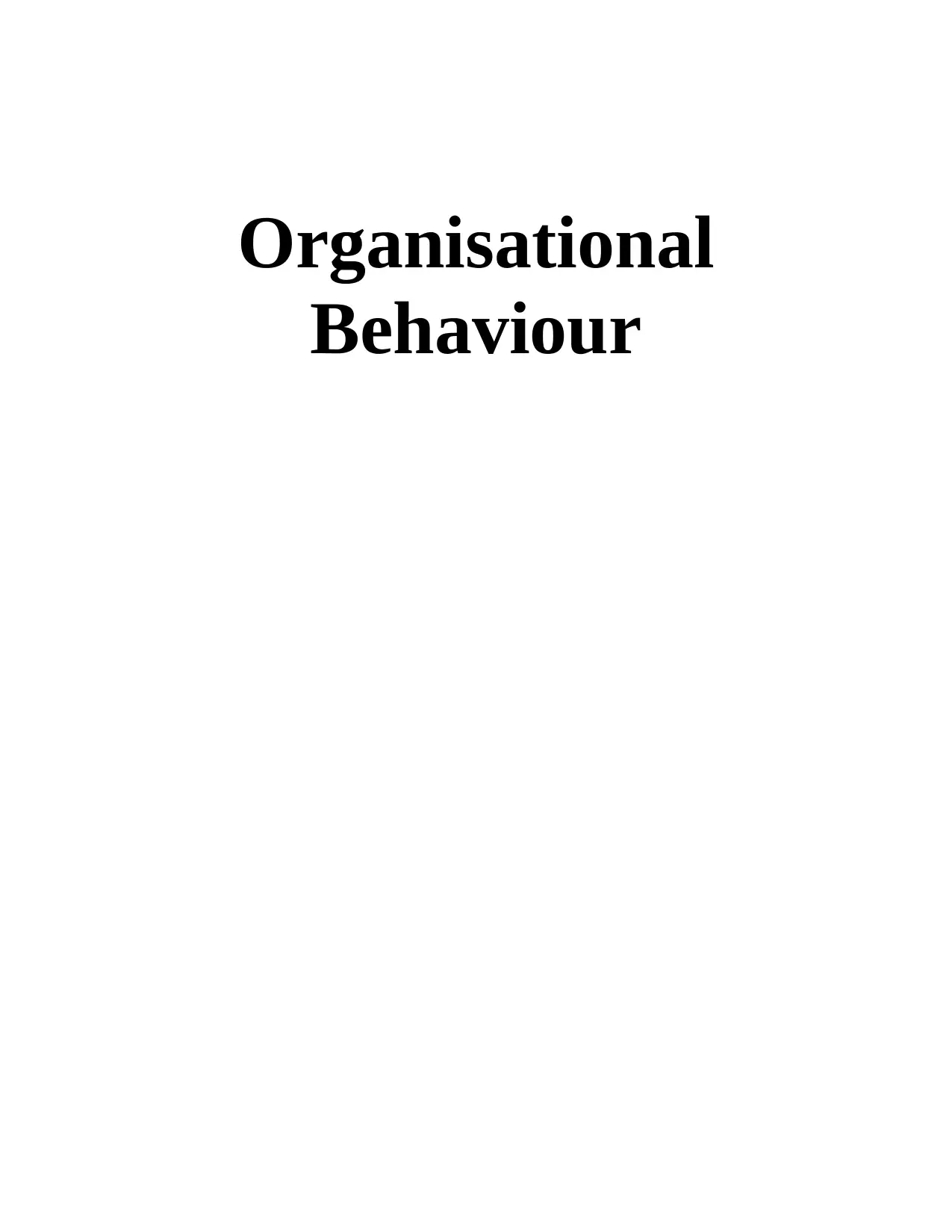
Organisational
Behaviour
Behaviour
Paraphrase This Document
Need a fresh take? Get an instant paraphrase of this document with our AI Paraphraser
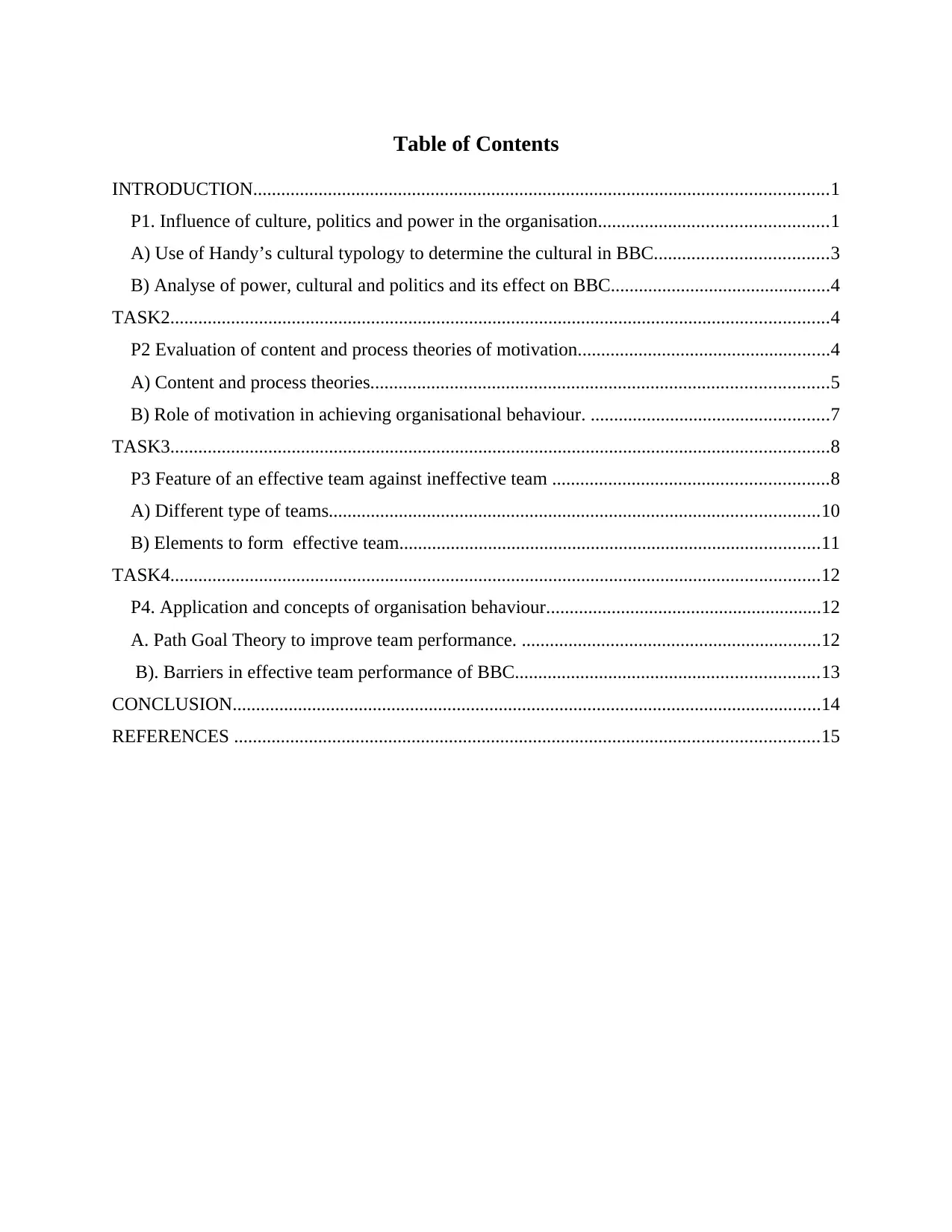
Table of Contents
INTRODUCTION...........................................................................................................................1
P1. Influence of culture, politics and power in the organisation.................................................1
A) Use of Handy’s cultural typology to determine the cultural in BBC.....................................3
B) Analyse of power, cultural and politics and its effect on BBC...............................................4
TASK2.............................................................................................................................................4
P2 Evaluation of content and process theories of motivation......................................................4
A) Content and process theories..................................................................................................5
B) Role of motivation in achieving organisational behaviour. ...................................................7
TASK3.............................................................................................................................................8
P3 Feature of an effective team against ineffective team ...........................................................8
A) Different type of teams.........................................................................................................10
B) Elements to form effective team..........................................................................................11
TASK4...........................................................................................................................................12
P4. Application and concepts of organisation behaviour...........................................................12
A. Path Goal Theory to improve team performance. ................................................................12
B). Barriers in effective team performance of BBC.................................................................13
CONCLUSION..............................................................................................................................14
REFERENCES .............................................................................................................................15
INTRODUCTION...........................................................................................................................1
P1. Influence of culture, politics and power in the organisation.................................................1
A) Use of Handy’s cultural typology to determine the cultural in BBC.....................................3
B) Analyse of power, cultural and politics and its effect on BBC...............................................4
TASK2.............................................................................................................................................4
P2 Evaluation of content and process theories of motivation......................................................4
A) Content and process theories..................................................................................................5
B) Role of motivation in achieving organisational behaviour. ...................................................7
TASK3.............................................................................................................................................8
P3 Feature of an effective team against ineffective team ...........................................................8
A) Different type of teams.........................................................................................................10
B) Elements to form effective team..........................................................................................11
TASK4...........................................................................................................................................12
P4. Application and concepts of organisation behaviour...........................................................12
A. Path Goal Theory to improve team performance. ................................................................12
B). Barriers in effective team performance of BBC.................................................................13
CONCLUSION..............................................................................................................................14
REFERENCES .............................................................................................................................15

⊘ This is a preview!⊘
Do you want full access?
Subscribe today to unlock all pages.

Trusted by 1+ million students worldwide
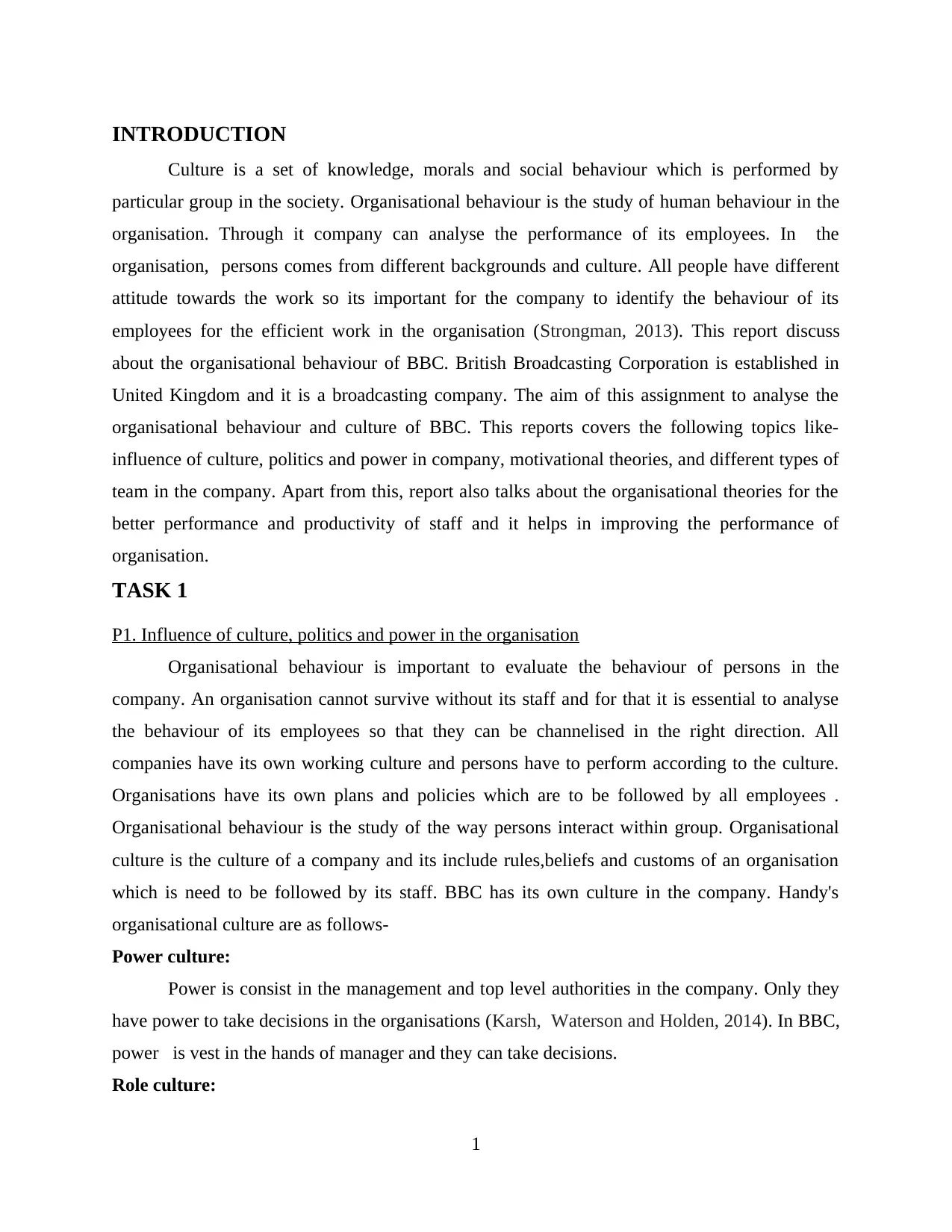
INTRODUCTION
Culture is a set of knowledge, morals and social behaviour which is performed by
particular group in the society. Organisational behaviour is the study of human behaviour in the
organisation. Through it company can analyse the performance of its employees. In the
organisation, persons comes from different backgrounds and culture. All people have different
attitude towards the work so its important for the company to identify the behaviour of its
employees for the efficient work in the organisation (Strongman, 2013). This report discuss
about the organisational behaviour of BBC. British Broadcasting Corporation is established in
United Kingdom and it is a broadcasting company. The aim of this assignment to analyse the
organisational behaviour and culture of BBC. This reports covers the following topics like-
influence of culture, politics and power in company, motivational theories, and different types of
team in the company. Apart from this, report also talks about the organisational theories for the
better performance and productivity of staff and it helps in improving the performance of
organisation.
TASK 1
P1. Influence of culture, politics and power in the organisation
Organisational behaviour is important to evaluate the behaviour of persons in the
company. An organisation cannot survive without its staff and for that it is essential to analyse
the behaviour of its employees so that they can be channelised in the right direction. All
companies have its own working culture and persons have to perform according to the culture.
Organisations have its own plans and policies which are to be followed by all employees .
Organisational behaviour is the study of the way persons interact within group. Organisational
culture is the culture of a company and its include rules,beliefs and customs of an organisation
which is need to be followed by its staff. BBC has its own culture in the company. Handy's
organisational culture are as follows-
Power culture:
Power is consist in the management and top level authorities in the company. Only they
have power to take decisions in the organisations (Karsh, Waterson and Holden, 2014). In BBC,
power is vest in the hands of manager and they can take decisions.
Role culture:
1
Culture is a set of knowledge, morals and social behaviour which is performed by
particular group in the society. Organisational behaviour is the study of human behaviour in the
organisation. Through it company can analyse the performance of its employees. In the
organisation, persons comes from different backgrounds and culture. All people have different
attitude towards the work so its important for the company to identify the behaviour of its
employees for the efficient work in the organisation (Strongman, 2013). This report discuss
about the organisational behaviour of BBC. British Broadcasting Corporation is established in
United Kingdom and it is a broadcasting company. The aim of this assignment to analyse the
organisational behaviour and culture of BBC. This reports covers the following topics like-
influence of culture, politics and power in company, motivational theories, and different types of
team in the company. Apart from this, report also talks about the organisational theories for the
better performance and productivity of staff and it helps in improving the performance of
organisation.
TASK 1
P1. Influence of culture, politics and power in the organisation
Organisational behaviour is important to evaluate the behaviour of persons in the
company. An organisation cannot survive without its staff and for that it is essential to analyse
the behaviour of its employees so that they can be channelised in the right direction. All
companies have its own working culture and persons have to perform according to the culture.
Organisations have its own plans and policies which are to be followed by all employees .
Organisational behaviour is the study of the way persons interact within group. Organisational
culture is the culture of a company and its include rules,beliefs and customs of an organisation
which is need to be followed by its staff. BBC has its own culture in the company. Handy's
organisational culture are as follows-
Power culture:
Power is consist in the management and top level authorities in the company. Only they
have power to take decisions in the organisations (Karsh, Waterson and Holden, 2014). In BBC,
power is vest in the hands of manager and they can take decisions.
Role culture:
1
Paraphrase This Document
Need a fresh take? Get an instant paraphrase of this document with our AI Paraphraser
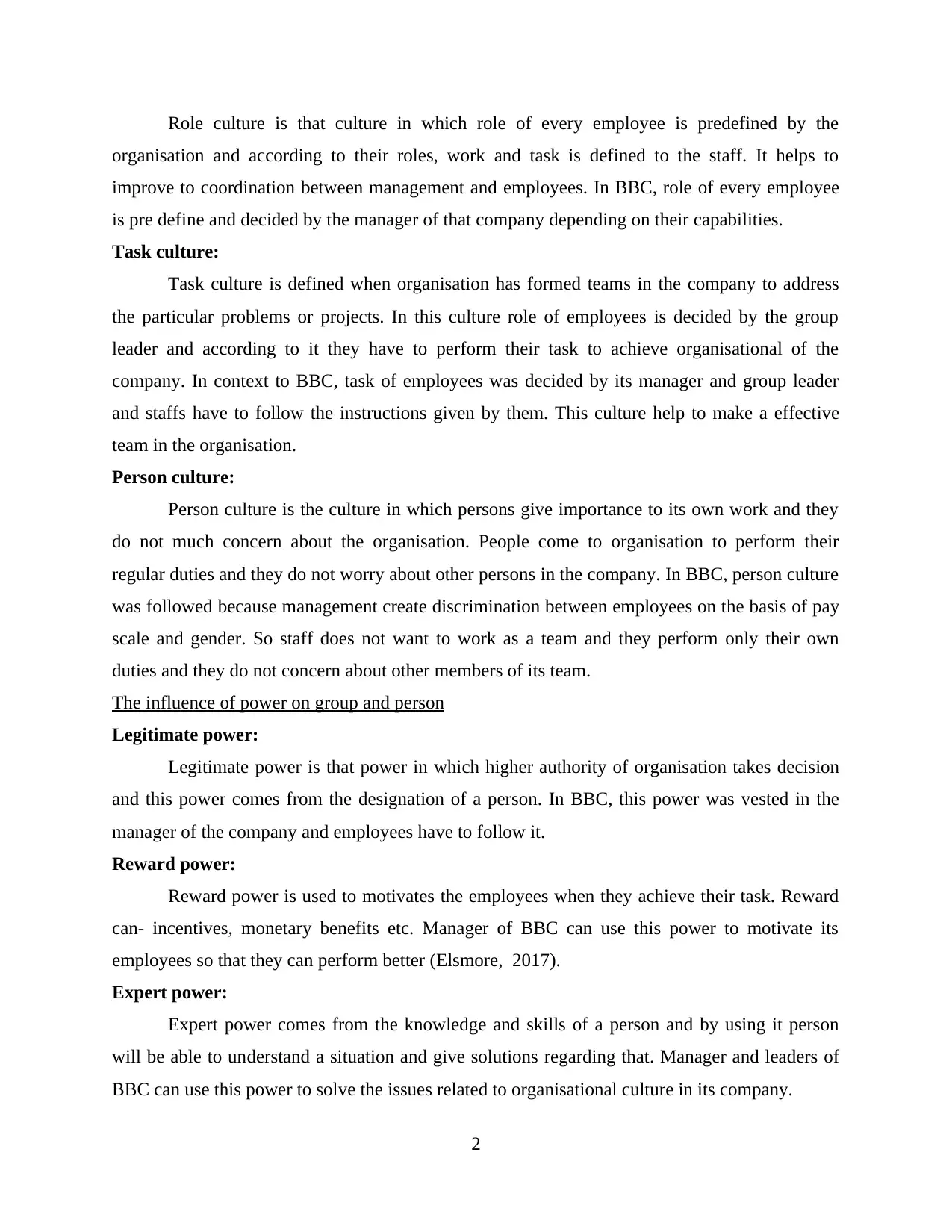
Role culture is that culture in which role of every employee is predefined by the
organisation and according to their roles, work and task is defined to the staff. It helps to
improve to coordination between management and employees. In BBC, role of every employee
is pre define and decided by the manager of that company depending on their capabilities.
Task culture:
Task culture is defined when organisation has formed teams in the company to address
the particular problems or projects. In this culture role of employees is decided by the group
leader and according to it they have to perform their task to achieve organisational of the
company. In context to BBC, task of employees was decided by its manager and group leader
and staffs have to follow the instructions given by them. This culture help to make a effective
team in the organisation.
Person culture:
Person culture is the culture in which persons give importance to its own work and they
do not much concern about the organisation. People come to organisation to perform their
regular duties and they do not worry about other persons in the company. In BBC, person culture
was followed because management create discrimination between employees on the basis of pay
scale and gender. So staff does not want to work as a team and they perform only their own
duties and they do not concern about other members of its team.
The influence of power on group and person
Legitimate power:
Legitimate power is that power in which higher authority of organisation takes decision
and this power comes from the designation of a person. In BBC, this power was vested in the
manager of the company and employees have to follow it.
Reward power:
Reward power is used to motivates the employees when they achieve their task. Reward
can- incentives, monetary benefits etc. Manager of BBC can use this power to motivate its
employees so that they can perform better (Elsmore, 2017).
Expert power:
Expert power comes from the knowledge and skills of a person and by using it person
will be able to understand a situation and give solutions regarding that. Manager and leaders of
BBC can use this power to solve the issues related to organisational culture in its company.
2
organisation and according to their roles, work and task is defined to the staff. It helps to
improve to coordination between management and employees. In BBC, role of every employee
is pre define and decided by the manager of that company depending on their capabilities.
Task culture:
Task culture is defined when organisation has formed teams in the company to address
the particular problems or projects. In this culture role of employees is decided by the group
leader and according to it they have to perform their task to achieve organisational of the
company. In context to BBC, task of employees was decided by its manager and group leader
and staffs have to follow the instructions given by them. This culture help to make a effective
team in the organisation.
Person culture:
Person culture is the culture in which persons give importance to its own work and they
do not much concern about the organisation. People come to organisation to perform their
regular duties and they do not worry about other persons in the company. In BBC, person culture
was followed because management create discrimination between employees on the basis of pay
scale and gender. So staff does not want to work as a team and they perform only their own
duties and they do not concern about other members of its team.
The influence of power on group and person
Legitimate power:
Legitimate power is that power in which higher authority of organisation takes decision
and this power comes from the designation of a person. In BBC, this power was vested in the
manager of the company and employees have to follow it.
Reward power:
Reward power is used to motivates the employees when they achieve their task. Reward
can- incentives, monetary benefits etc. Manager of BBC can use this power to motivate its
employees so that they can perform better (Elsmore, 2017).
Expert power:
Expert power comes from the knowledge and skills of a person and by using it person
will be able to understand a situation and give solutions regarding that. Manager and leaders of
BBC can use this power to solve the issues related to organisational culture in its company.
2
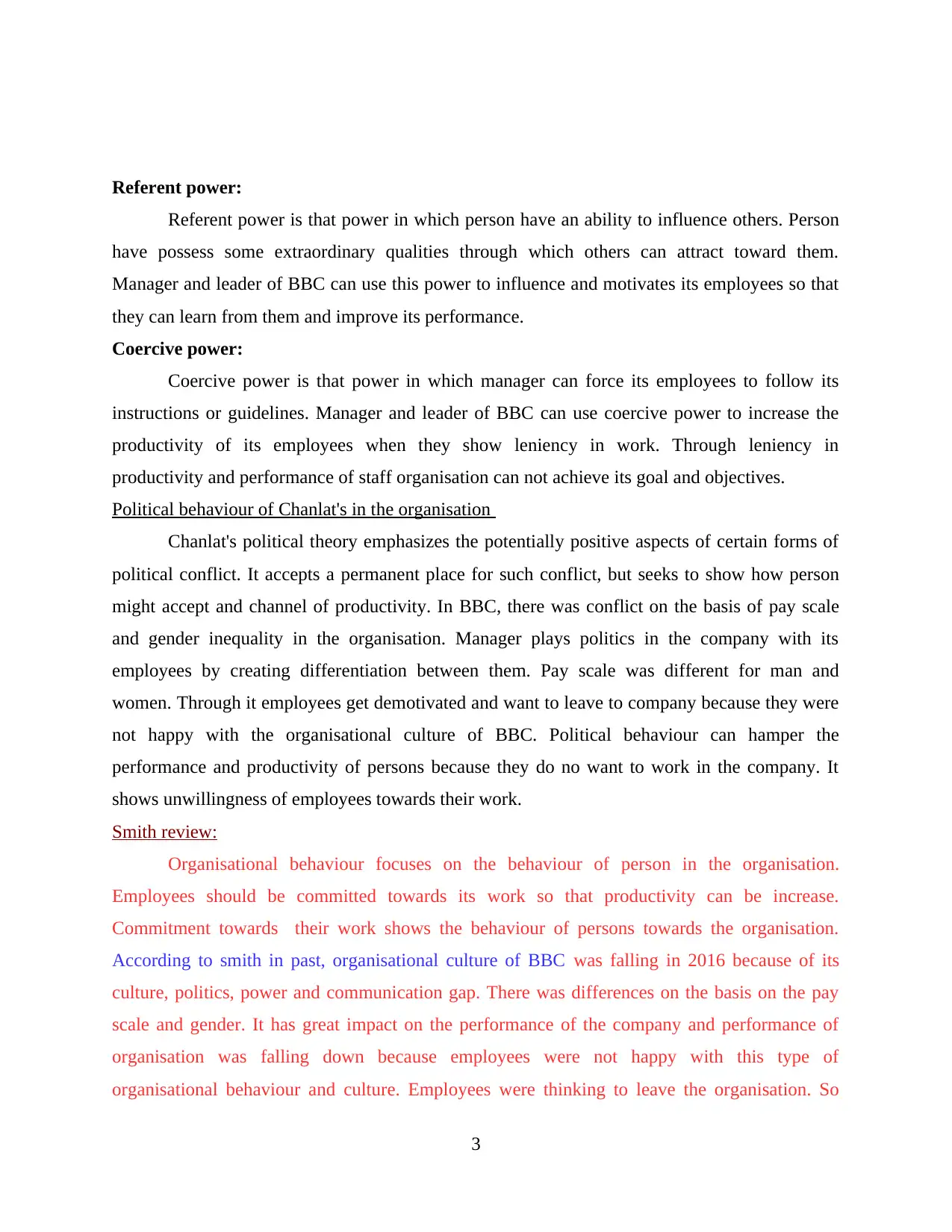
Referent power:
Referent power is that power in which person have an ability to influence others. Person
have possess some extraordinary qualities through which others can attract toward them.
Manager and leader of BBC can use this power to influence and motivates its employees so that
they can learn from them and improve its performance.
Coercive power:
Coercive power is that power in which manager can force its employees to follow its
instructions or guidelines. Manager and leader of BBC can use coercive power to increase the
productivity of its employees when they show leniency in work. Through leniency in
productivity and performance of staff organisation can not achieve its goal and objectives.
Political behaviour of Chanlat's in the organisation
Chanlat's political theory emphasizes the potentially positive aspects of certain forms of
political conflict. It accepts a permanent place for such conflict, but seeks to show how person
might accept and channel of productivity. In BBC, there was conflict on the basis of pay scale
and gender inequality in the organisation. Manager plays politics in the company with its
employees by creating differentiation between them. Pay scale was different for man and
women. Through it employees get demotivated and want to leave to company because they were
not happy with the organisational culture of BBC. Political behaviour can hamper the
performance and productivity of persons because they do no want to work in the company. It
shows unwillingness of employees towards their work.
Smith review:
Organisational behaviour focuses on the behaviour of person in the organisation.
Employees should be committed towards its work so that productivity can be increase.
Commitment towards their work shows the behaviour of persons towards the organisation.
According to smith in past, organisational culture of BBC was falling in 2016 because of its
culture, politics, power and communication gap. There was differences on the basis on the pay
scale and gender. It has great impact on the performance of the company and performance of
organisation was falling down because employees were not happy with this type of
organisational behaviour and culture. Employees were thinking to leave the organisation. So
3
Referent power is that power in which person have an ability to influence others. Person
have possess some extraordinary qualities through which others can attract toward them.
Manager and leader of BBC can use this power to influence and motivates its employees so that
they can learn from them and improve its performance.
Coercive power:
Coercive power is that power in which manager can force its employees to follow its
instructions or guidelines. Manager and leader of BBC can use coercive power to increase the
productivity of its employees when they show leniency in work. Through leniency in
productivity and performance of staff organisation can not achieve its goal and objectives.
Political behaviour of Chanlat's in the organisation
Chanlat's political theory emphasizes the potentially positive aspects of certain forms of
political conflict. It accepts a permanent place for such conflict, but seeks to show how person
might accept and channel of productivity. In BBC, there was conflict on the basis of pay scale
and gender inequality in the organisation. Manager plays politics in the company with its
employees by creating differentiation between them. Pay scale was different for man and
women. Through it employees get demotivated and want to leave to company because they were
not happy with the organisational culture of BBC. Political behaviour can hamper the
performance and productivity of persons because they do no want to work in the company. It
shows unwillingness of employees towards their work.
Smith review:
Organisational behaviour focuses on the behaviour of person in the organisation.
Employees should be committed towards its work so that productivity can be increase.
Commitment towards their work shows the behaviour of persons towards the organisation.
According to smith in past, organisational culture of BBC was falling in 2016 because of its
culture, politics, power and communication gap. There was differences on the basis on the pay
scale and gender. It has great impact on the performance of the company and performance of
organisation was falling down because employees were not happy with this type of
organisational behaviour and culture. Employees were thinking to leave the organisation. So
3
⊘ This is a preview!⊘
Do you want full access?
Subscribe today to unlock all pages.

Trusted by 1+ million students worldwide
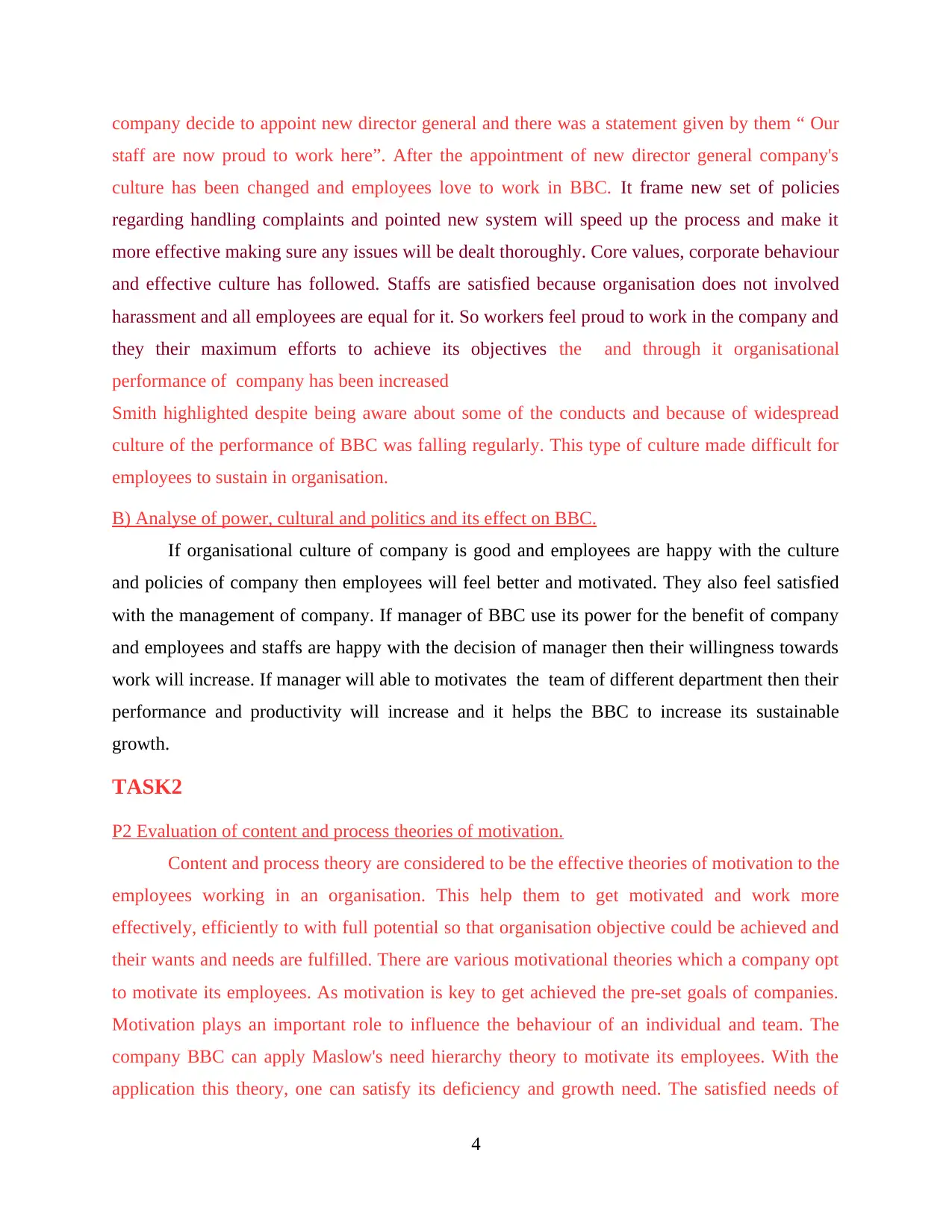
company decide to appoint new director general and there was a statement given by them “ Our
staff are now proud to work here”. After the appointment of new director general company's
culture has been changed and employees love to work in BBC. It frame new set of policies
regarding handling complaints and pointed new system will speed up the process and make it
more effective making sure any issues will be dealt thoroughly. Core values, corporate behaviour
and effective culture has followed. Staffs are satisfied because organisation does not involved
harassment and all employees are equal for it. So workers feel proud to work in the company and
they their maximum efforts to achieve its objectives the and through it organisational
performance of company has been increased
Smith highlighted despite being aware about some of the conducts and because of widespread
culture of the performance of BBC was falling regularly. This type of culture made difficult for
employees to sustain in organisation.
B) Analyse of power, cultural and politics and its effect on BBC.
If organisational culture of company is good and employees are happy with the culture
and policies of company then employees will feel better and motivated. They also feel satisfied
with the management of company. If manager of BBC use its power for the benefit of company
and employees and staffs are happy with the decision of manager then their willingness towards
work will increase. If manager will able to motivates the team of different department then their
performance and productivity will increase and it helps the BBC to increase its sustainable
growth.
TASK2
P2 Evaluation of content and process theories of motivation.
Content and process theory are considered to be the effective theories of motivation to the
employees working in an organisation. This help them to get motivated and work more
effectively, efficiently to with full potential so that organisation objective could be achieved and
their wants and needs are fulfilled. There are various motivational theories which a company opt
to motivate its employees. As motivation is key to get achieved the pre-set goals of companies.
Motivation plays an important role to influence the behaviour of an individual and team. The
company BBC can apply Maslow's need hierarchy theory to motivate its employees. With the
application this theory, one can satisfy its deficiency and growth need. The satisfied needs of
4
staff are now proud to work here”. After the appointment of new director general company's
culture has been changed and employees love to work in BBC. It frame new set of policies
regarding handling complaints and pointed new system will speed up the process and make it
more effective making sure any issues will be dealt thoroughly. Core values, corporate behaviour
and effective culture has followed. Staffs are satisfied because organisation does not involved
harassment and all employees are equal for it. So workers feel proud to work in the company and
they their maximum efforts to achieve its objectives the and through it organisational
performance of company has been increased
Smith highlighted despite being aware about some of the conducts and because of widespread
culture of the performance of BBC was falling regularly. This type of culture made difficult for
employees to sustain in organisation.
B) Analyse of power, cultural and politics and its effect on BBC.
If organisational culture of company is good and employees are happy with the culture
and policies of company then employees will feel better and motivated. They also feel satisfied
with the management of company. If manager of BBC use its power for the benefit of company
and employees and staffs are happy with the decision of manager then their willingness towards
work will increase. If manager will able to motivates the team of different department then their
performance and productivity will increase and it helps the BBC to increase its sustainable
growth.
TASK2
P2 Evaluation of content and process theories of motivation.
Content and process theory are considered to be the effective theories of motivation to the
employees working in an organisation. This help them to get motivated and work more
effectively, efficiently to with full potential so that organisation objective could be achieved and
their wants and needs are fulfilled. There are various motivational theories which a company opt
to motivate its employees. As motivation is key to get achieved the pre-set goals of companies.
Motivation plays an important role to influence the behaviour of an individual and team. The
company BBC can apply Maslow's need hierarchy theory to motivate its employees. With the
application this theory, one can satisfy its deficiency and growth need. The satisfied needs of
4
Paraphrase This Document
Need a fresh take? Get an instant paraphrase of this document with our AI Paraphraser
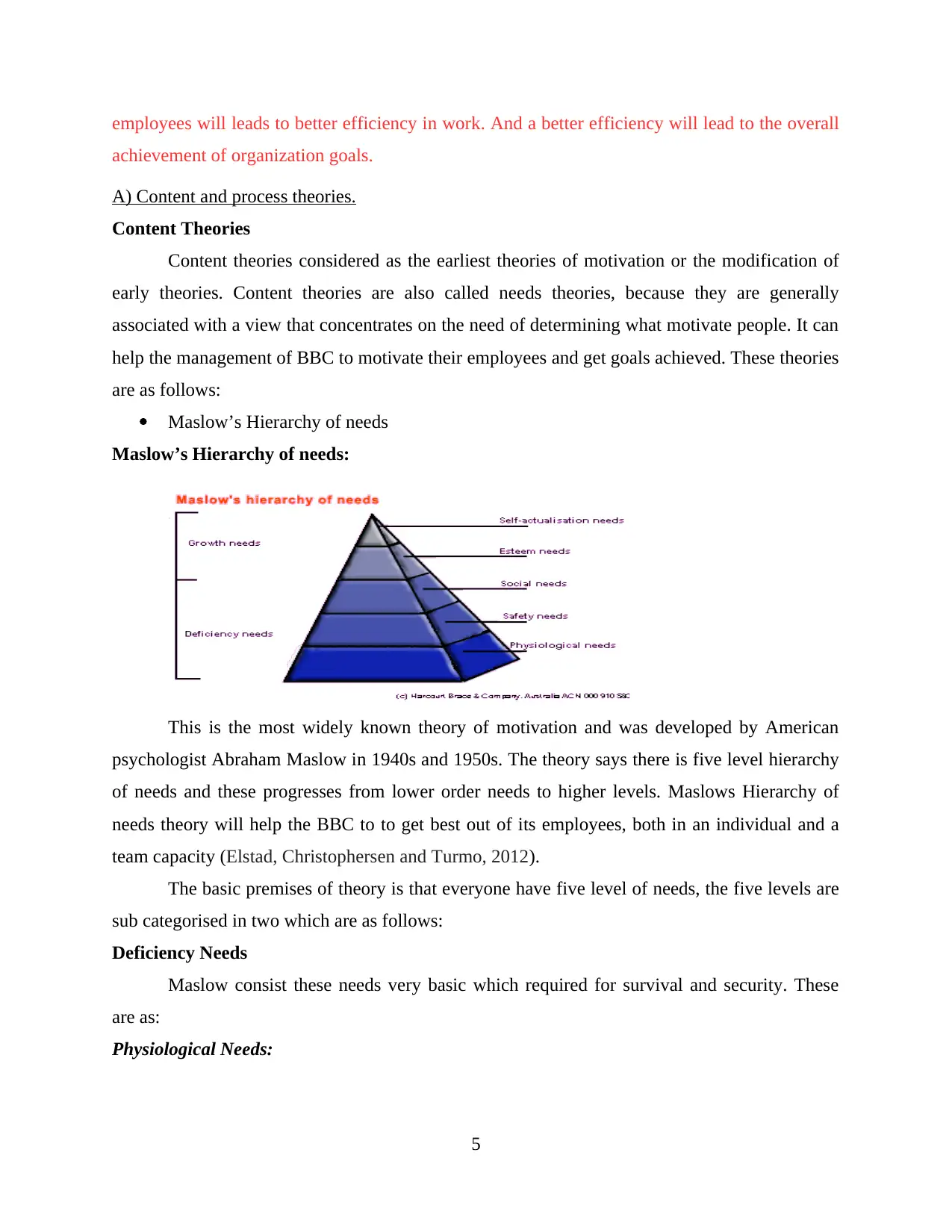
employees will leads to better efficiency in work. And a better efficiency will lead to the overall
achievement of organization goals.
A) Content and process theories.
Content Theories
Content theories considered as the earliest theories of motivation or the modification of
early theories. Content theories are also called needs theories, because they are generally
associated with a view that concentrates on the need of determining what motivate people. It can
help the management of BBC to motivate their employees and get goals achieved. These theories
are as follows:
Maslow’s Hierarchy of needs
Maslow’s Hierarchy of needs:
This is the most widely known theory of motivation and was developed by American
psychologist Abraham Maslow in 1940s and 1950s. The theory says there is five level hierarchy
of needs and these progresses from lower order needs to higher levels. Maslows Hierarchy of
needs theory will help the BBC to to get best out of its employees, both in an individual and a
team capacity (Elstad, Christophersen and Turmo, 2012).
The basic premises of theory is that everyone have five level of needs, the five levels are
sub categorised in two which are as follows:
Deficiency Needs
Maslow consist these needs very basic which required for survival and security. These
are as:
Physiological Needs:
5
achievement of organization goals.
A) Content and process theories.
Content Theories
Content theories considered as the earliest theories of motivation or the modification of
early theories. Content theories are also called needs theories, because they are generally
associated with a view that concentrates on the need of determining what motivate people. It can
help the management of BBC to motivate their employees and get goals achieved. These theories
are as follows:
Maslow’s Hierarchy of needs
Maslow’s Hierarchy of needs:
This is the most widely known theory of motivation and was developed by American
psychologist Abraham Maslow in 1940s and 1950s. The theory says there is five level hierarchy
of needs and these progresses from lower order needs to higher levels. Maslows Hierarchy of
needs theory will help the BBC to to get best out of its employees, both in an individual and a
team capacity (Elstad, Christophersen and Turmo, 2012).
The basic premises of theory is that everyone have five level of needs, the five levels are
sub categorised in two which are as follows:
Deficiency Needs
Maslow consist these needs very basic which required for survival and security. These
are as:
Physiological Needs:
5
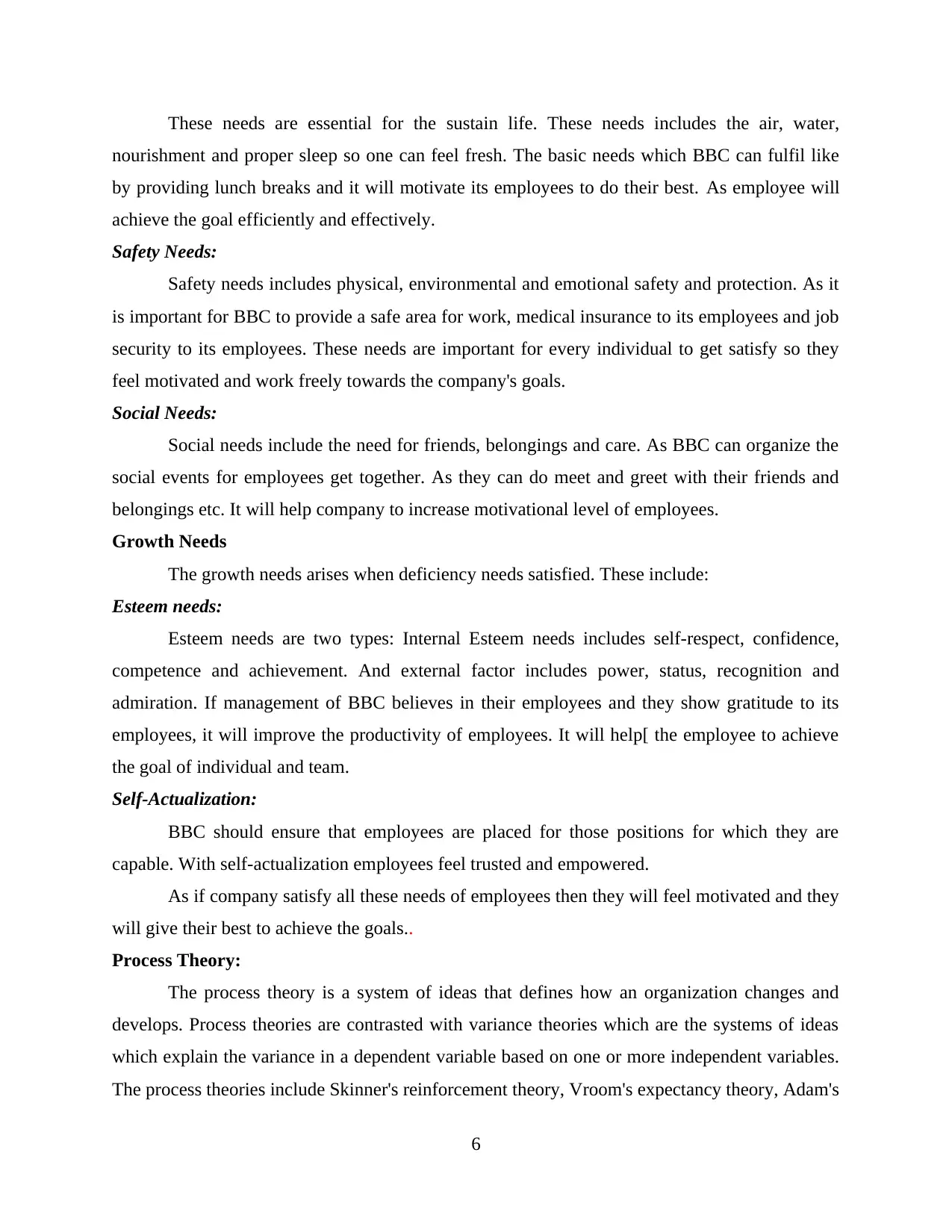
These needs are essential for the sustain life. These needs includes the air, water,
nourishment and proper sleep so one can feel fresh. The basic needs which BBC can fulfil like
by providing lunch breaks and it will motivate its employees to do their best. As employee will
achieve the goal efficiently and effectively.
Safety Needs:
Safety needs includes physical, environmental and emotional safety and protection. As it
is important for BBC to provide a safe area for work, medical insurance to its employees and job
security to its employees. These needs are important for every individual to get satisfy so they
feel motivated and work freely towards the company's goals.
Social Needs:
Social needs include the need for friends, belongings and care. As BBC can organize the
social events for employees get together. As they can do meet and greet with their friends and
belongings etc. It will help company to increase motivational level of employees.
Growth Needs
The growth needs arises when deficiency needs satisfied. These include:
Esteem needs:
Esteem needs are two types: Internal Esteem needs includes self-respect, confidence,
competence and achievement. And external factor includes power, status, recognition and
admiration. If management of BBC believes in their employees and they show gratitude to its
employees, it will improve the productivity of employees. It will help[ the employee to achieve
the goal of individual and team.
Self-Actualization:
BBC should ensure that employees are placed for those positions for which they are
capable. With self-actualization employees feel trusted and empowered.
As if company satisfy all these needs of employees then they will feel motivated and they
will give their best to achieve the goals..
Process Theory:
The process theory is a system of ideas that defines how an organization changes and
develops. Process theories are contrasted with variance theories which are the systems of ideas
which explain the variance in a dependent variable based on one or more independent variables.
The process theories include Skinner's reinforcement theory, Vroom's expectancy theory, Adam's
6
nourishment and proper sleep so one can feel fresh. The basic needs which BBC can fulfil like
by providing lunch breaks and it will motivate its employees to do their best. As employee will
achieve the goal efficiently and effectively.
Safety Needs:
Safety needs includes physical, environmental and emotional safety and protection. As it
is important for BBC to provide a safe area for work, medical insurance to its employees and job
security to its employees. These needs are important for every individual to get satisfy so they
feel motivated and work freely towards the company's goals.
Social Needs:
Social needs include the need for friends, belongings and care. As BBC can organize the
social events for employees get together. As they can do meet and greet with their friends and
belongings etc. It will help company to increase motivational level of employees.
Growth Needs
The growth needs arises when deficiency needs satisfied. These include:
Esteem needs:
Esteem needs are two types: Internal Esteem needs includes self-respect, confidence,
competence and achievement. And external factor includes power, status, recognition and
admiration. If management of BBC believes in their employees and they show gratitude to its
employees, it will improve the productivity of employees. It will help[ the employee to achieve
the goal of individual and team.
Self-Actualization:
BBC should ensure that employees are placed for those positions for which they are
capable. With self-actualization employees feel trusted and empowered.
As if company satisfy all these needs of employees then they will feel motivated and they
will give their best to achieve the goals..
Process Theory:
The process theory is a system of ideas that defines how an organization changes and
develops. Process theories are contrasted with variance theories which are the systems of ideas
which explain the variance in a dependent variable based on one or more independent variables.
The process theories include Skinner's reinforcement theory, Vroom's expectancy theory, Adam's
6
⊘ This is a preview!⊘
Do you want full access?
Subscribe today to unlock all pages.

Trusted by 1+ million students worldwide
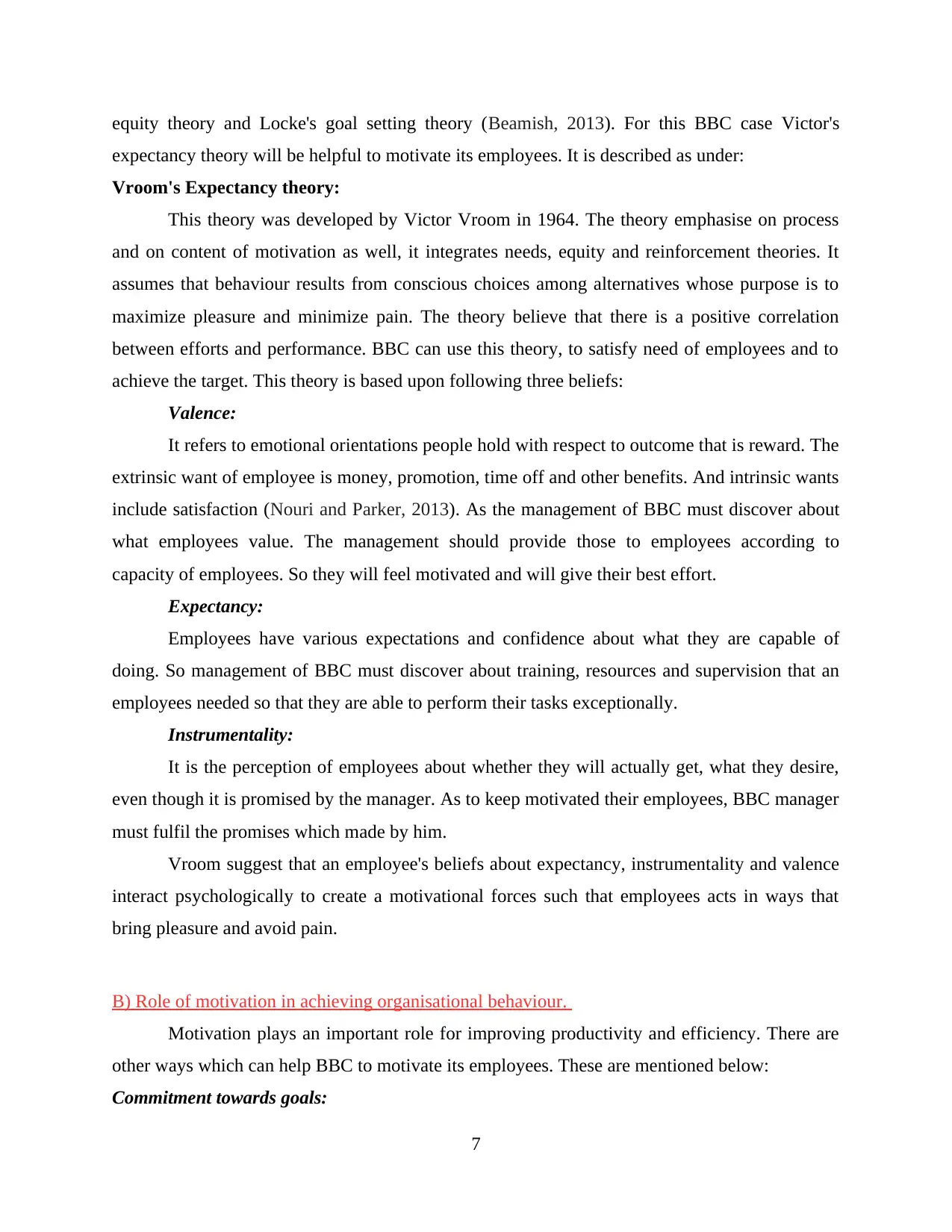
equity theory and Locke's goal setting theory (Beamish, 2013). For this BBC case Victor's
expectancy theory will be helpful to motivate its employees. It is described as under:
Vroom's Expectancy theory:
This theory was developed by Victor Vroom in 1964. The theory emphasise on process
and on content of motivation as well, it integrates needs, equity and reinforcement theories. It
assumes that behaviour results from conscious choices among alternatives whose purpose is to
maximize pleasure and minimize pain. The theory believe that there is a positive correlation
between efforts and performance. BBC can use this theory, to satisfy need of employees and to
achieve the target. This theory is based upon following three beliefs:
Valence:
It refers to emotional orientations people hold with respect to outcome that is reward. The
extrinsic want of employee is money, promotion, time off and other benefits. And intrinsic wants
include satisfaction (Nouri and Parker, 2013). As the management of BBC must discover about
what employees value. The management should provide those to employees according to
capacity of employees. So they will feel motivated and will give their best effort.
Expectancy:
Employees have various expectations and confidence about what they are capable of
doing. So management of BBC must discover about training, resources and supervision that an
employees needed so that they are able to perform their tasks exceptionally.
Instrumentality:
It is the perception of employees about whether they will actually get, what they desire,
even though it is promised by the manager. As to keep motivated their employees, BBC manager
must fulfil the promises which made by him.
Vroom suggest that an employee's beliefs about expectancy, instrumentality and valence
interact psychologically to create a motivational forces such that employees acts in ways that
bring pleasure and avoid pain.
B) Role of motivation in achieving organisational behaviour.
Motivation plays an important role for improving productivity and efficiency. There are
other ways which can help BBC to motivate its employees. These are mentioned below:
Commitment towards goals:
7
expectancy theory will be helpful to motivate its employees. It is described as under:
Vroom's Expectancy theory:
This theory was developed by Victor Vroom in 1964. The theory emphasise on process
and on content of motivation as well, it integrates needs, equity and reinforcement theories. It
assumes that behaviour results from conscious choices among alternatives whose purpose is to
maximize pleasure and minimize pain. The theory believe that there is a positive correlation
between efforts and performance. BBC can use this theory, to satisfy need of employees and to
achieve the target. This theory is based upon following three beliefs:
Valence:
It refers to emotional orientations people hold with respect to outcome that is reward. The
extrinsic want of employee is money, promotion, time off and other benefits. And intrinsic wants
include satisfaction (Nouri and Parker, 2013). As the management of BBC must discover about
what employees value. The management should provide those to employees according to
capacity of employees. So they will feel motivated and will give their best effort.
Expectancy:
Employees have various expectations and confidence about what they are capable of
doing. So management of BBC must discover about training, resources and supervision that an
employees needed so that they are able to perform their tasks exceptionally.
Instrumentality:
It is the perception of employees about whether they will actually get, what they desire,
even though it is promised by the manager. As to keep motivated their employees, BBC manager
must fulfil the promises which made by him.
Vroom suggest that an employee's beliefs about expectancy, instrumentality and valence
interact psychologically to create a motivational forces such that employees acts in ways that
bring pleasure and avoid pain.
B) Role of motivation in achieving organisational behaviour.
Motivation plays an important role for improving productivity and efficiency. There are
other ways which can help BBC to motivate its employees. These are mentioned below:
Commitment towards goals:
7
Paraphrase This Document
Need a fresh take? Get an instant paraphrase of this document with our AI Paraphraser
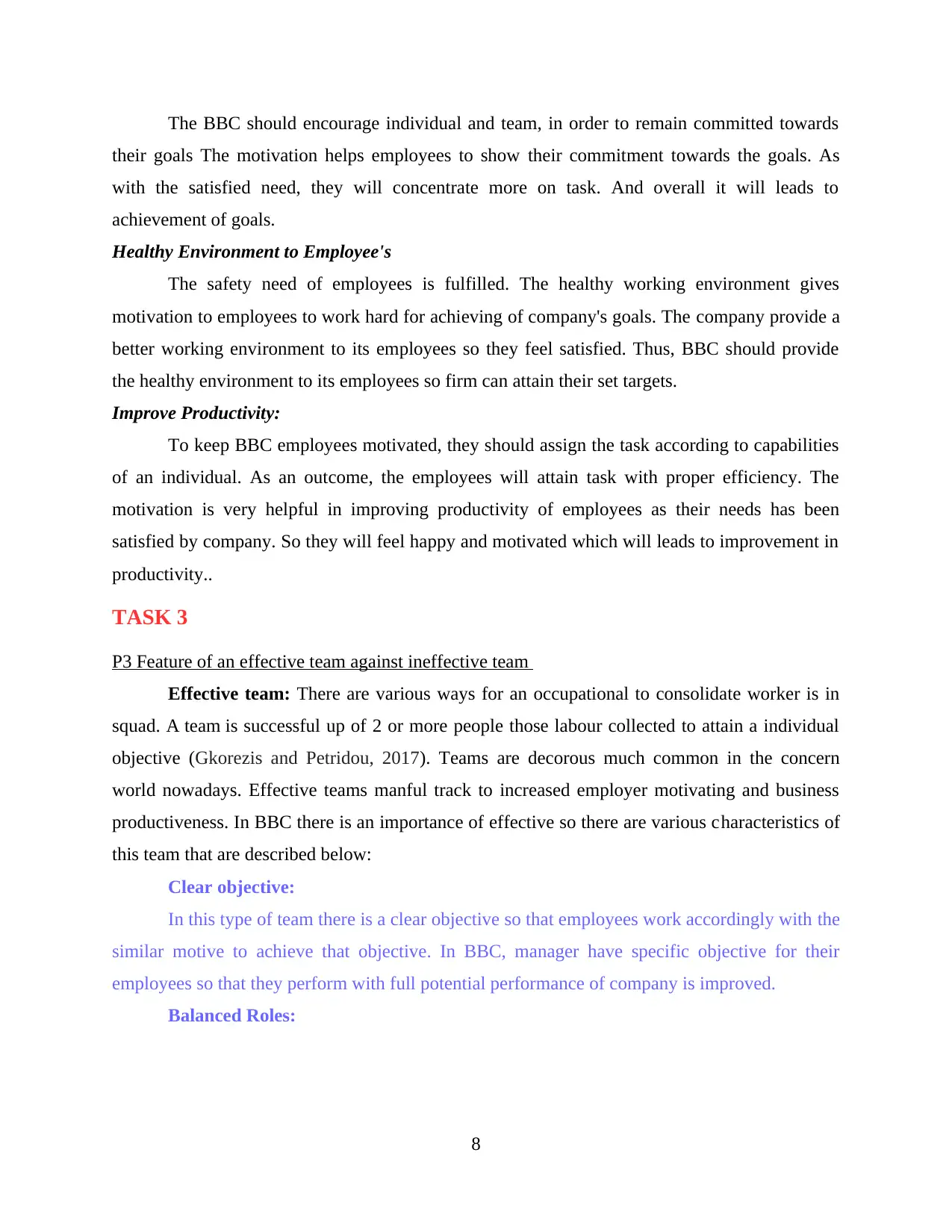
The BBC should encourage individual and team, in order to remain committed towards
their goals The motivation helps employees to show their commitment towards the goals. As
with the satisfied need, they will concentrate more on task. And overall it will leads to
achievement of goals.
Healthy Environment to Employee's
The safety need of employees is fulfilled. The healthy working environment gives
motivation to employees to work hard for achieving of company's goals. The company provide a
better working environment to its employees so they feel satisfied. Thus, BBC should provide
the healthy environment to its employees so firm can attain their set targets.
Improve Productivity:
To keep BBC employees motivated, they should assign the task according to capabilities
of an individual. As an outcome, the employees will attain task with proper efficiency. The
motivation is very helpful in improving productivity of employees as their needs has been
satisfied by company. So they will feel happy and motivated which will leads to improvement in
productivity..
TASK 3
P3 Feature of an effective team against ineffective team
Effective team: There are various ways for an occupational to consolidate worker is in
squad. A team is successful up of 2 or more people those labour collected to attain a individual
objective (Gkorezis and Petridou, 2017). Teams are decorous much common in the concern
world nowadays. Effective teams manful track to increased employer motivating and business
productiveness. In BBC there is an importance of effective so there are various characteristics of
this team that are described below:
Clear objective:
In this type of team there is a clear objective so that employees work accordingly with the
similar motive to achieve that objective. In BBC, manager have specific objective for their
employees so that they perform with full potential performance of company is improved.
Balanced Roles:
8
their goals The motivation helps employees to show their commitment towards the goals. As
with the satisfied need, they will concentrate more on task. And overall it will leads to
achievement of goals.
Healthy Environment to Employee's
The safety need of employees is fulfilled. The healthy working environment gives
motivation to employees to work hard for achieving of company's goals. The company provide a
better working environment to its employees so they feel satisfied. Thus, BBC should provide
the healthy environment to its employees so firm can attain their set targets.
Improve Productivity:
To keep BBC employees motivated, they should assign the task according to capabilities
of an individual. As an outcome, the employees will attain task with proper efficiency. The
motivation is very helpful in improving productivity of employees as their needs has been
satisfied by company. So they will feel happy and motivated which will leads to improvement in
productivity..
TASK 3
P3 Feature of an effective team against ineffective team
Effective team: There are various ways for an occupational to consolidate worker is in
squad. A team is successful up of 2 or more people those labour collected to attain a individual
objective (Gkorezis and Petridou, 2017). Teams are decorous much common in the concern
world nowadays. Effective teams manful track to increased employer motivating and business
productiveness. In BBC there is an importance of effective so there are various characteristics of
this team that are described below:
Clear objective:
In this type of team there is a clear objective so that employees work accordingly with the
similar motive to achieve that objective. In BBC, manager have specific objective for their
employees so that they perform with full potential performance of company is improved.
Balanced Roles:
8
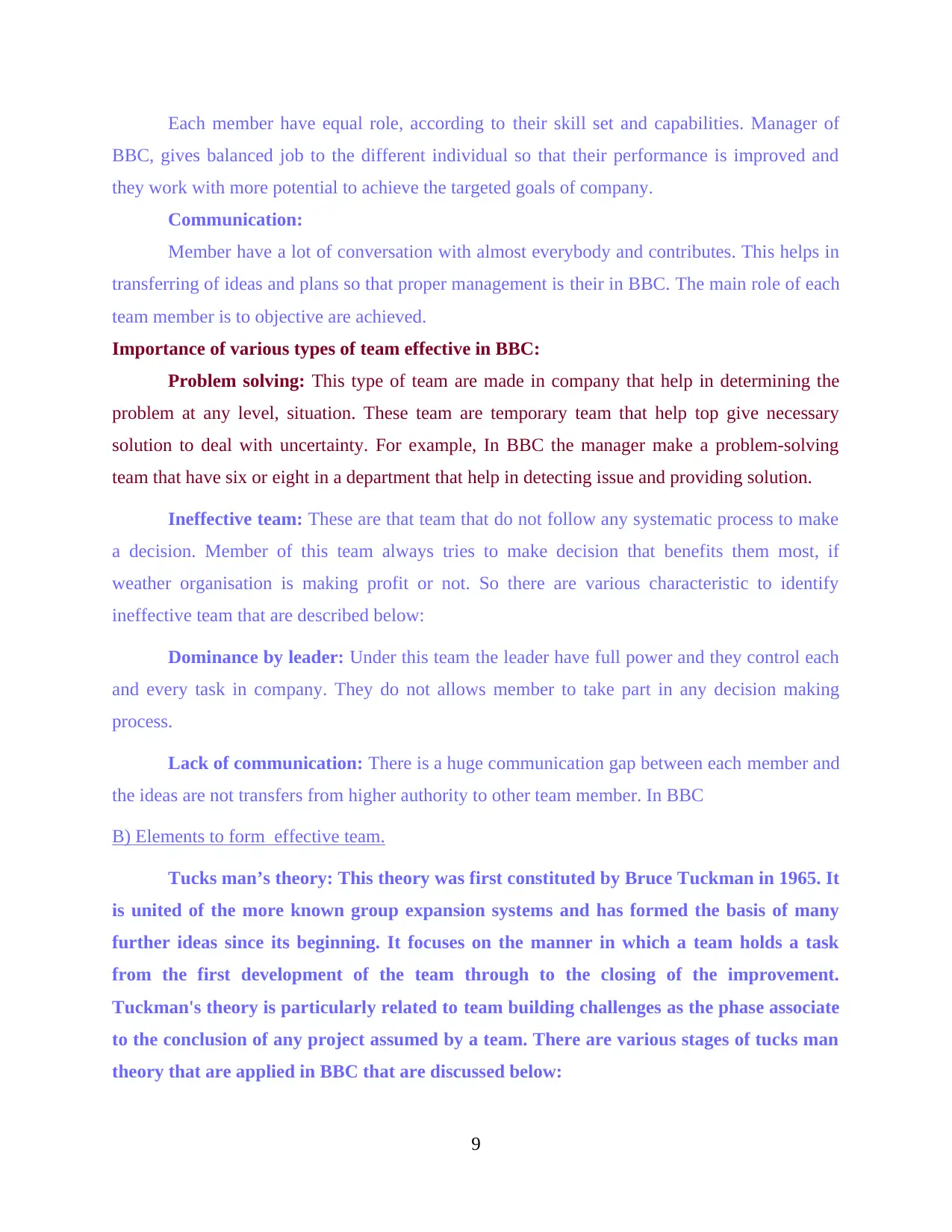
Each member have equal role, according to their skill set and capabilities. Manager of
BBC, gives balanced job to the different individual so that their performance is improved and
they work with more potential to achieve the targeted goals of company.
Communication:
Member have a lot of conversation with almost everybody and contributes. This helps in
transferring of ideas and plans so that proper management is their in BBC. The main role of each
team member is to objective are achieved.
Importance of various types of team effective in BBC:
Problem solving: This type of team are made in company that help in determining the
problem at any level, situation. These team are temporary team that help top give necessary
solution to deal with uncertainty. For example, In BBC the manager make a problem-solving
team that have six or eight in a department that help in detecting issue and providing solution.
Ineffective team: These are that team that do not follow any systematic process to make
a decision. Member of this team always tries to make decision that benefits them most, if
weather organisation is making profit or not. So there are various characteristic to identify
ineffective team that are described below:
Dominance by leader: Under this team the leader have full power and they control each
and every task in company. They do not allows member to take part in any decision making
process.
Lack of communication: There is a huge communication gap between each member and
the ideas are not transfers from higher authority to other team member. In BBC
B) Elements to form effective team.
Tucks man’s theory: This theory was first constituted by Bruce Tuckman in 1965. It
is united of the more known group expansion systems and has formed the basis of many
further ideas since its beginning. It focuses on the manner in which a team holds a task
from the first development of the team through to the closing of the improvement.
Tuckman's theory is particularly related to team building challenges as the phase associate
to the conclusion of any project assumed by a team. There are various stages of tucks man
theory that are applied in BBC that are discussed below:
9
BBC, gives balanced job to the different individual so that their performance is improved and
they work with more potential to achieve the targeted goals of company.
Communication:
Member have a lot of conversation with almost everybody and contributes. This helps in
transferring of ideas and plans so that proper management is their in BBC. The main role of each
team member is to objective are achieved.
Importance of various types of team effective in BBC:
Problem solving: This type of team are made in company that help in determining the
problem at any level, situation. These team are temporary team that help top give necessary
solution to deal with uncertainty. For example, In BBC the manager make a problem-solving
team that have six or eight in a department that help in detecting issue and providing solution.
Ineffective team: These are that team that do not follow any systematic process to make
a decision. Member of this team always tries to make decision that benefits them most, if
weather organisation is making profit or not. So there are various characteristic to identify
ineffective team that are described below:
Dominance by leader: Under this team the leader have full power and they control each
and every task in company. They do not allows member to take part in any decision making
process.
Lack of communication: There is a huge communication gap between each member and
the ideas are not transfers from higher authority to other team member. In BBC
B) Elements to form effective team.
Tucks man’s theory: This theory was first constituted by Bruce Tuckman in 1965. It
is united of the more known group expansion systems and has formed the basis of many
further ideas since its beginning. It focuses on the manner in which a team holds a task
from the first development of the team through to the closing of the improvement.
Tuckman's theory is particularly related to team building challenges as the phase associate
to the conclusion of any project assumed by a team. There are various stages of tucks man
theory that are applied in BBC that are discussed below:
9
⊘ This is a preview!⊘
Do you want full access?
Subscribe today to unlock all pages.

Trusted by 1+ million students worldwide
1 out of 18
Related Documents
Your All-in-One AI-Powered Toolkit for Academic Success.
+13062052269
info@desklib.com
Available 24*7 on WhatsApp / Email
![[object Object]](/_next/static/media/star-bottom.7253800d.svg)
Unlock your academic potential
Copyright © 2020–2026 A2Z Services. All Rights Reserved. Developed and managed by ZUCOL.





